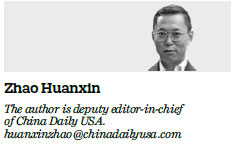One step forward, one step back for global carbon emission cuts
The divergence of policies and priorities of the world's two largest economies in combating climate change stood in stark contrast on Monday. In Beijing, where improving air quality has become a major policy priority, China's top economic planner unveiled plans for a national carbon market - likely the world's largest - where enterprises can trade their emissions credits. It is another bold step the country is taking to deliver on its Paris Agreement promises.
In contrast, Washington policy observers were quick to point out that the new US National Security Strategy released by the White House on Monday had removed climate change from the list of worldwide threats menacing the United States. It was a significant departure from the Barack Obama administration, which described climate change as an "urgent and growing threat" to US national security.

The initial phase of China's carbon trading program is expected to cover 1,700 power plants, which emit 3.3 billion metric tons of carbon annually, or about one-third of the nation's total emissions, according to the National Development and Reform Commission.















